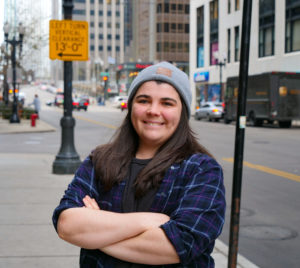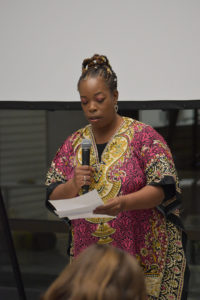October 17, 2019
Vice News: More than 16,000 kids in Chicago Public Schools are homeless. Teachers just went on strike to help them.
“They end up not coming to school because they fall through the cracks.”
By Alex Lubben
One student in the Chicago school where Marcella Cadena teaches lives in a homeless shelter that only lets people in or out every hour, on the hour. And sometimes, the child can’t make it out in time — and misses class.
“Now they’re coming to school late and missing 30 minutes of instruction if they don’t make it out by 7 a.m. because they don’t have control over where they’re living,” said 4th-grade teacher Cadena, one of the 25,000 teachers in the Chicago Public Schools who went on strike Thursday.
The striking teachers in Chicago are making an unusual demand: that the country’s third-largest district do more for students who don’t have a stable roof over their heads. In addition to the standard asks of better pay and smaller class sizes, teachers want the school system to provide resources, including dedicated counselors and funding, to help both students and teachers grappling with a lack of affordable housing. Of the 300,000 students in Chicago’s public schools, an estimated 16,450 are homeless. And that’s based on students self-reporting, so it’s likely a low count.
…When one student in Chicago showed up to class without her homework, she hadn’t forgotten to do it. She tried. But she didn’t have keys to her friend’s apartment, where she was staying while her own family searched for something they could afford. And no one was at her friend’s place to let her in.
“They were always unsure night to night whether they would have housing, and they talked about how difficult it was to just study when you had no space that was your own,” Doug Schenkelberg, the executive director of the Chicago Coalition for the Homeless, told VICE News.
Link to the full report
October 17, 2019
Chicago Sun-Times: New proposals on the table, but Chicago teachers strike enters Day 2
By Nader Issa
…The CTU put forward a new framework for staffing demands that includes a minimum number of nurses, librarians, social workers and counselors that the district would need to hire. The union said it’s willing to phase in those positions over the term of the deal by starting at schools with high numbers of low-income students, but it said it received no substantive response.
And on affordable housing, the two sides discussed the creation of a new position that would deal solely with helping students who are homeless. Right now, a mixture of teachers, social workers and counselors help children manage those struggles. The city’s position is that only schools with 90 or more homeless students would receive that worker. The union said there were only 12 schools citywide that would meet that criteria.
Link to the full report
October 14, 2019
Chicago Sun-Times: Lightfoot takes first step to chip away at 120,000-unit shortage of affordable housing
By Fran Spielman
Mayor Lori Lightfoot on Monday took the first step down the long road that must be traveled to chip away at a 120,000-unit shortage of affordable units now driving Chicago’s precipitous population decline.
Lightfoot started confronting the monumental challenge the same way Chicago politicians almost always confront intransigent problems — by creating a task force.
This one will include up to 20 members charged with revising an “Affordable Requirements Ordinance” that applies to developers receiving city subsidies, city land or a zoning change. They are required to make 10-to-20 percent of the units they build or renovate affordable or pay hefty fees “in lieu of” building on-site units.
…Lightfoot campaigned on a promise to impose a graduated real estate transfer tax to “create a dedicated revenue stream” to reduce homelessness by 45 percent and begin to chip away at the affordable housing shortage.
But the $838 million shortfall she claims to have inherited has apparently altered the new mayor’s game plan.
She now wants to raise the transfer tax on homes sold for over $500,000, instead of $1 million, but use some of the windfall to reduce the shortfall.
That has Novara going back to the drawing board to find other ways to solve the gentrification/affordable housing crisis that was a driving force behind the election of six aldermen backed by the Democratic Socialists of America.
Link to the full report
October 4, 2019
Chicago Tribune: As hope for new source of city money fades, Chicago youth homeless programs at risk of losing federal funding too
By Elaine Chen
After Derek Chairs was evicted from an apartment in California at 18, he bounced around from couch to couch across the country.
“I just traveled by bus, state to state, Iowa, Nebraska, Colorado, Texas, Indiana,” he said. Then at 20 he landed in Chicago, where, for the first time in his adult life, he received stable housing for almost a year, through a youth homeless program called Ignite.
“That time that I see is little, they really make it matter,” Chairs said. He jump-started the process of getting his high school equivalency certificate and now has a job at Ignite’s drop-in center.
“They my family,” he said. “I always consider them to be family.”
Transitional housing programs in Chicago such as Ignite, one- to two-year programs that provide housing, financial support and casework largely for homeless youth, are increasingly at risk of losing funding from the U.S. Department of Housing and Urban Development, providers of the programs say.
The federal funding application for Chicago’s homeless programs submitted at the end of September places transitional housing programs at a lower priority than all other types of homeless programs that primarily serve adults.
Homeless advocates and some aldermen have called for a tax increase on real estate sales to create a city fund for homeless programs. But Mayor Lori Lightfoot over the summer began considering using the proposed increase to balance the city’s budget instead.
Link to the full report
September 30, 2019
The Golden Mean on Apple Podcasts: July interview with CCH Executive Director Doug Schenkelberg
Link to the podcast
September 25, 2019
Block Club Chicago: People living outside vacant Logan Square bank lose everything after city workers toss belongings – homeless advocates
By Mina Bloom
LOGAN SQUARE — A group of people living on an abandoned bank property at Western and Armitage avenues in Logan Square had their personal belongings thrown out during a city cleanup last week.
“I’m frustrated by how it went down because it was very outside of what our expectations were,” Ald. Daniel La Spata said. La Spata’s 1st Ward includes the former MB Financial Bank property at 2000 N. Western Ave.
“Our expectations were that they were going to clean and sanitize the space. … The way they were treated, the way their personal items were discarded, particularly for the folks who weren’t there and didn’t have a choice, was deeply frustrating,” the alderman said.
The cleanup happened around 9 a.m. Sept. 17, according to La Spata. Police and city workers were on the scene, according to photos shared with Block Club Chicago.
The workers threw out personal items belonging to three or four people experiencing homelessness. Only one of them was on the property when the cleanup occurred. The rest were not there when their personal items were thrown out, according to La Spata and Diane O’ Connell, a community lawyer for the Chicago Coalition for the Homeless.
Link to the full report
September 5, 2019
WTTW: Aldermen, advocates want city tax to support homeless students, families
By Matt Masterson
More than 16,000 Chicago Public Schools students dealt with some form of homelessness last school year, a majority of whom lived in 10 predominantly South and West side wards. Now, Chicago aldermen and a local nonprofit are calling on Mayor Lori Lightfoot to support what they believe could be an “immediate solution.”
Members of the Chicago Coalition for the Homeless on Thursday asked the mayor to back an increase to the city’s real estate transfer tax and use those funds to directly address homelessness affecting families and students.
Advocates say a stable local funding stream is necessary because the vast majority of local homeless families aren’t eligible for federal benefits.
“There’s really very little that anyone can do right now with the current resources to lead the charge on this because there simply is no available housing,” Julie Dworkin, director of policy for the Chicago Coalition for the Homeless, told WTTW News. “We have thousands of people on the waitlists for public housing, there’s very little turnover in our existing permanent supportive housing units.
“Most of those are for single adults … the federal government has prioritized single adults over families for many years. So very, very few of those units are for families and then on top of that, the vast majority of families that are homeless are not eligible.
Link to the full report
September 5, 2019
Chicago Tribune: In Chicago, more than 16,000 students are homeless, new report says: ‘I felt very embarrassed to tell people’
By Hannah Leone
Inside his old running shoes, blood streaked Dontay Lockett’s toenails. His track coach at Chicago’s Lake View High School noticed when he took off the sneakers, which were several sizes too small. The high school junior had been wearing the same pair since seventh grade.
The coach who found him new shoes had also slowly gained his trust. When he finally told her he was living in a shelter, she had already figured it out.
Students in temporary living situations rarely self-identify, according to advocates. Lockett, now 22, said he didn’t like his classmates and teachers to know he was homeless. But his situation is hardly unique.
More than 16,450 Chicago Public Schools students didn’t have a permanent home during the 2018-19 school year, according to numbers released Thursday by the Chicago Coalition for the Homeless. Most were in temporary living situations, meaning they stayed in shelters, motels, cars or, in about 90% of the cases, “doubled up” with others, according to the coalition. Doubling up doesn’t generally meet the federal government’s definition of homelessness, so people in those situations don’t qualify for federal programs for those without homes.
About half of the city’s homeless students were in 10 of the city’s 50 wards, according to the coalition’s data. At least 865 were believed to be living in Ald. Walter Burnett’s 27th Ward. Burnett spoke at a homeless coalition news conference Thursday at City Hall to plug a proposed increase to the real estate transfer tax on properties worth more than $1 million to address the situation.
“We need to put the people first,” Burnett said. “We need to help the needy and not the greedy.”
The advocates’ proposed 1.2 percentage point increase could generate about $150 million that could be used to reduce homelessness. The coalition said that’s 10 times as much funding as what’s already dedicated to the issue.
Link to the full report
September 5, 2019
Chicago Sun-Times: ‘The kids and I were sleeping in the car’: CPS parents, students talk about being homeless, urge Lightfoot to keep campaign promise
By Fran Spielman
As the mother of six, the grandmother of nine and a victim of foreclosure, Bridgette Barber knows the pain of homelessness and the devastating impact it has on kids.
So does Lake View H.S. graduate Dontay Lockett. His “downward spiral” — to “three different states and four different high schools” — began when he, his mom and his sister were kicked out of the house by his mom’s ex-boyfriend.
On Thursday, Barber and Lockett told their stories at a City Hall news conference called to keep the heat on Mayor Lori Lightfoot to deliver on her campaign promise to create a “dedicated revenue stream” to combat homelessness.
Barber spoke haltingly and through tears about the ordeal that began with a 2014 foreclosure.
“The kids and I were sleeping in the car. Hotels. On the floor of friends’ homes. We started going from house to house and living doubled up. It would become hard to bring the kids to school,” said Barber, the legal guardian of two grandchildren attending Chicago Public Schools.
Link to the full report






